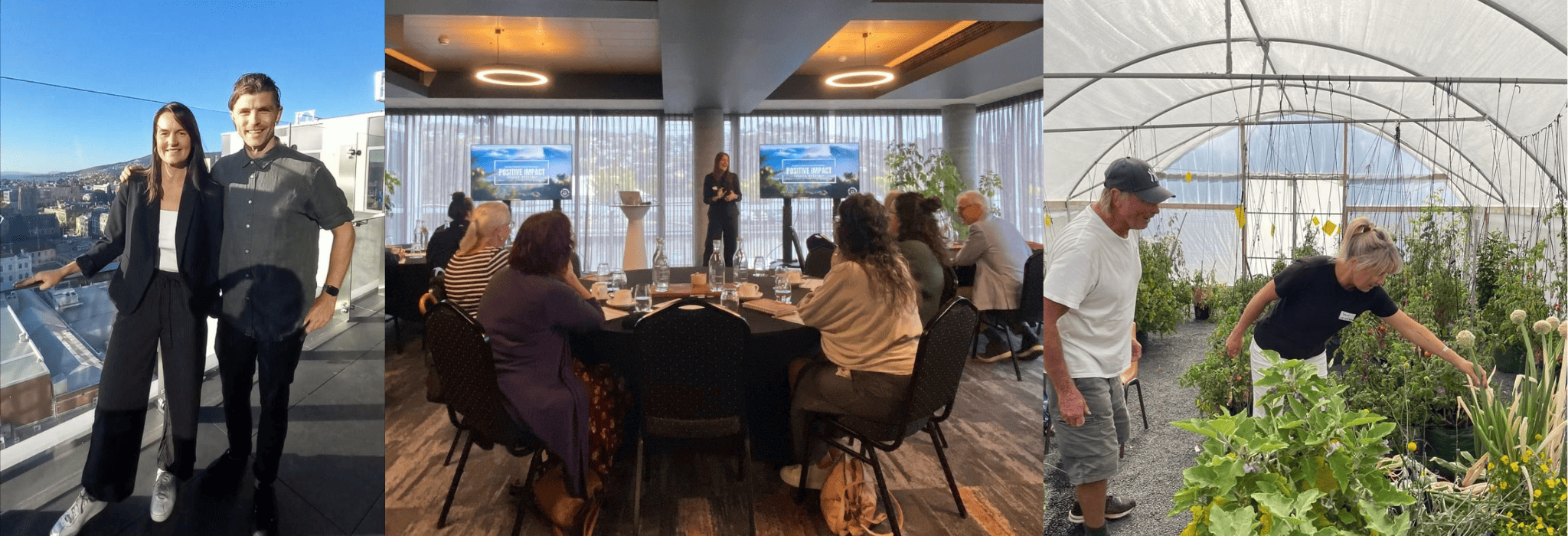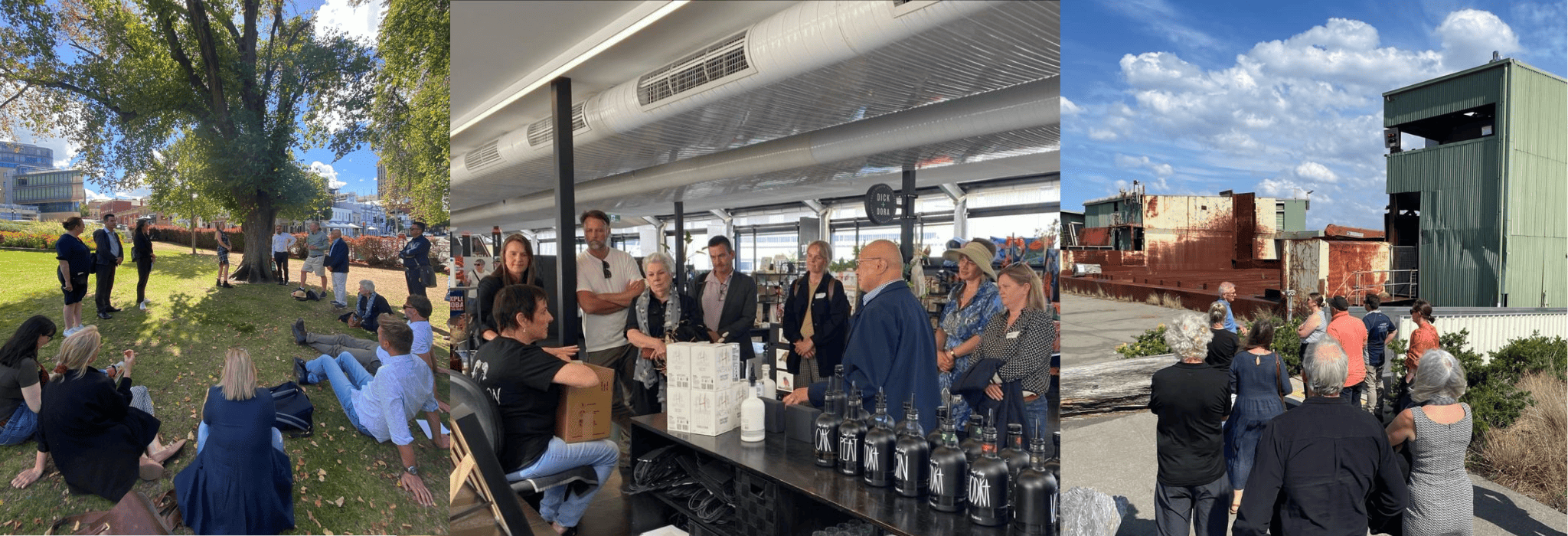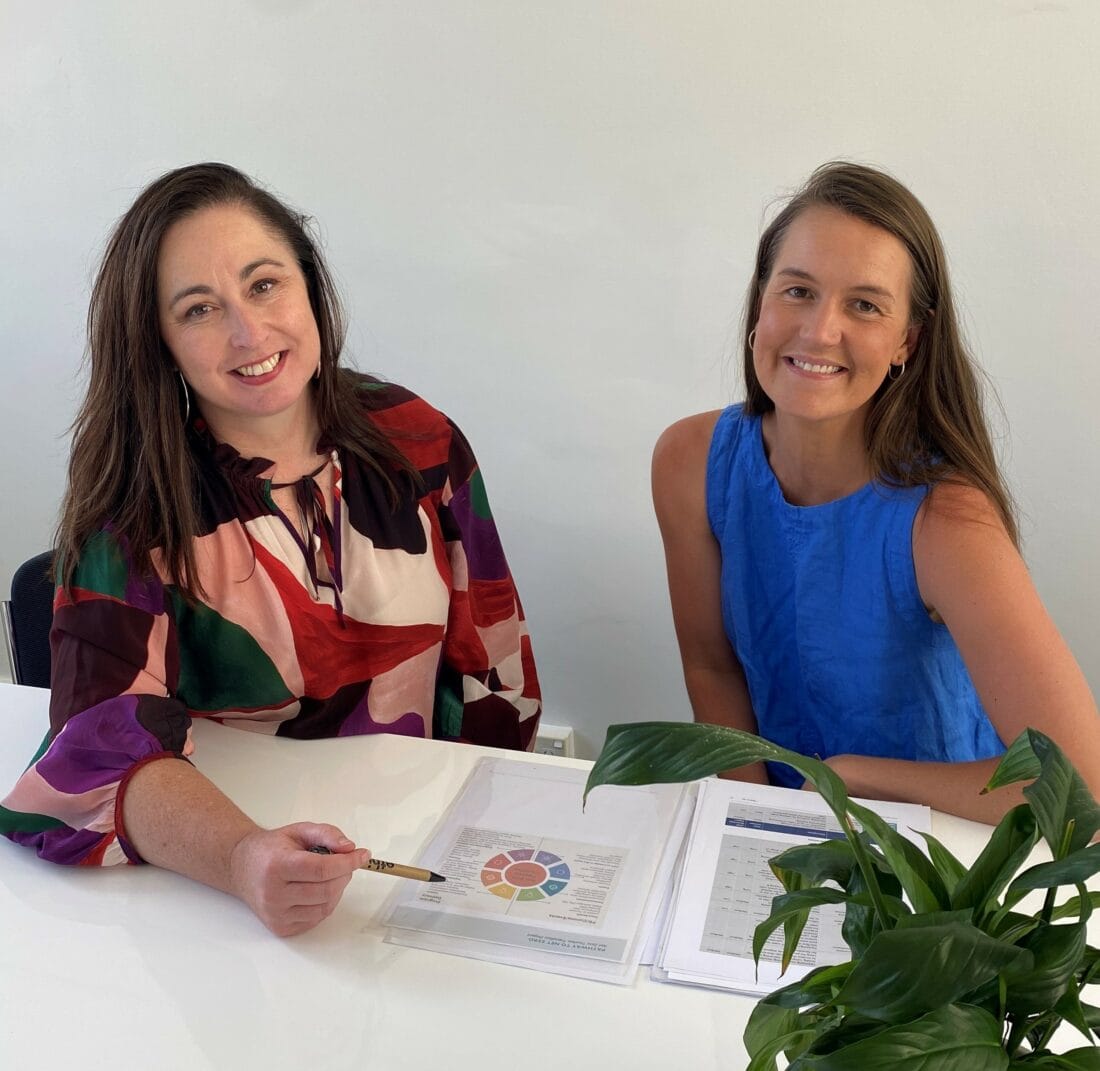Tourism Industry Council Tasmania
Positive Impact Tourism Roadshow
In March 2024, we embarked on a roadshow of Tasmania in partnership with Tourism Industry Council Tasmania (TICT), the peak body for Tasmania’s tourism industry, to run Positive Impact Tourism Live workshops and Learning tours for their tourism industry partners across 3 destinations (Hobart, Triabunna & Launceston).
A wide range of tourism businesses and organisations from across the state joined the full-day programs which combined a practical workshop, with networking, and a learning tour where attendees could be inspired by positive impact projects happening in action in their region.
Background
TICT is the peak body representing the Tasmanian tourism industry. They have a key role in many of the goals and actions of the new Tasmania’s 2030 Visitor Economy Strategy, specifically for Key Direction 1: Become a leading destination for climate-conscious travel.
To activate this Key Direction, TICT has an Emissions Reduction Program, to support Tasmanian tourism businesses in reducing emissions, and work towards achieving Tasmania’s net zero emissions ambition.
To support TICT with their ambition, The Tourism Collective partnered with TICT to deliver industry-leading workshops (x 3) and learning tours (x 2) for Tasmania Tourism Operators.
The Tourism Collective met with each Regional Tourism Organisation to find leading positive impact case studies, and design an engagement Learning Tour, connecting council, operators and local community organisations.
To reflect and add to the relevant areas of learning with regards to emissions reductions, we also met with ERC and Sumday Carbon Accounting Partner’s to better understand how the tools work, in partnership with TICT’s guidance and feedback.

Positive Impact Tourism Workshop
Our Regenerative Tourism Specialist, Nic Cooper delivered highly practical, action-based and inspiring Positive Impact tourism Live Workshop that gave operators both inspiration and tools to take immediate and longer-term action in their business.
Nic worked with TICT to craft tailored workshop content, building on The Tourism Collectives existing Sustainable and Regenerative Workshop and Learning Tour, and aligning to support TICT Emissions Reduction Program.
Throughout the workshop each business was able to work on their own business positive impact and emissions reduction plan by setting short, and long-term goals, giving tangible takeaways which could be applied immediately after the workshop and into the future.
Content Themes
- Values & Purpose
- Positive Impact Tourism Principles
- Practical Implementation Ideas
- Emission reduction ideas
Key Outcomes for Tourism Business Owners
- Inspire operators to take action with practical case studies and examples
- Inspire connections and partnerships of tourism businesses in Tasmania’s regions, and
- Build and leverage the Regional Tourism Organisation’s own positive impact programs (for example Destination Southern Tasmania’s CSR Program or East Coast Tasmania’s early stage Positive Impact Strategy).
- Confidently start thinking about and mapping their sustainability and regenerative journey, with rock solid, practical steps to get started with both short and longer term actions.
- Understand sustainability is an ongoing journey, not a destination (or a tick box exercise!)
- Support their application/rating improvement of their chosen sustainability accreditations (eg. Ecotourism Australia Strive 4 Sustainability Scorecard, BCorp etc)
- Have a network of likeminded businesses who are on the same journey, so they have the local support to continue learning together
Local Impact Learning Tours
The Local Positive Impact Learning tours helped inspire ideas for each business, as well as generate collaborations and conversations for positive impact action both within individual businesses and the wider Tasmania regions.
Hobart
After the morning live workshop, we facilitated an interactive half-day learning tour for the businesses to become fully immersed in some of the positive impact initiatives that were happening in and around Hobart.
Learning Tours are a fantastic way for the industry to go behind the scenes of businesses who are leading the way to see positive impact in action.
The group spent the afternoon visiting and learning from 3 businesses:
Diane Rae from Grandvewe Cheese welcomed the group to their retail outlet on Brooke Street Pier and presented on their multi-faceted approach to reducing waste across the business including:
- Use frozen sheep’s wool instead of polystyrene to insulate cheeses when posting.
- Research has found that the sheep’s wool works for 36 hours longer than polystyrene so it’s an action that’s good for business, the customer receiving a fresher product, and tackles waste.
- Wrap cheeses using home compostable vacuum pouch by Grounded Packaging (B-Corp)
- Use bi-product which would usually go to waste to make sheeps whey vodka, gins and other spirits. The vodka won worlds best vodka.
- Purchased a machine that turns old carboard into packaging so can use to box up carboard.
- Use a box instead of plastic can holders for slim mixer cans Hartshorn sell.
Robbie Gilligan from Derwent Distillery met the group at the Institute for Marine & Antarctic Studies (IMAS) who together with Dr Jemina Stuart-Smith from the Handfish Conservation Project presented on the collaboration that led to the Last Sanctuary Gin to support conservation of the handfish:
- The red handfish is critically endangered due to habitat loss/degradation, climate change, human disturbance and other factors.
- IMAS are doing critical work in assessing the population size and habitat, successful breeding and restocking, preventing further habitat loss and ecosystem restoration.
- Partnership with Derwent Distillery and The Last Sanctuary Gin, is crucial in raising awareness which is crucial to conservation in leveraging political support and generating funding.
- Derwent Distillery wanted to create a product to support a crucial project that was on their doorstep.
- They donate a portion of sales from Last Sanctuary Gin to the Handfish Conservation Project.
- The Last Sanctuary Gin also uses local botanicals that grow by the Derwent River.
- They have found that the gin adds to their story, connects with customers and empowers community and creates stewardship over the environment.
Kitana Mansell at Palawa Kipli presented to the group about being the first Aboriginal Tasmanian Food Business and her goal for people to know that Tasmanian / Australian food cuisine is Aboriginal food.
Kitana works with visitors and wider community to show culture is strong and thriving collaborating with chefs and events to introduce more local native produce into menus.
Following the learning tour the group had the option of networking further at Manky Sally’s Bar in Salamanca market which has many fantastic initiatives of reclaiming and upcycling much of the fit out of the bar to give it a new life.
Triabunna
After the morning live workshop, the group was taken on an interactive half-day learning tour going behind the scenes of incredible positive impact initiatives happening in Triabunna.
With the live workshop in the morning taking place at Spring Bay Mill, we were fortunate to be taken around the property after lunch by the owner Graeme Wood sharing and showing many stories and sustainable practices across the site including:
- Transforming previously the worlds largest wood chip mill into a sustainable events space and accommodation.
- Planted over 25,000 endemic plants including many rare and threatened species.
- Strive to minimize dependence on non-renewable energy. Beach shacks run solely on solar power with low-energy lighting and EV’s onsite.
- On site nursery propagates over 2000 plants annually.
- Garden to plate produce grown on site for events.
- Beach shacks rely on rainwater along and are compost toilets.
- All food packaging is compostable or biodegradable.
After the tour of Spring Bay Mill, we continued the learning tour by visiting Sea Forest where the group were taken behind the scenes of the labs and processing facilities for using the bioactives in seaweed, to include in very low quantities as a feed additive, greatly reducing the production of methane from livestock
Sea Forest have also collaborated with several brands to create products and increase exposure of Sea Forests mission including:
- 4 Pines Brewing (B-Corp) Seaweed Beer - ‘Why Is There Seaweed In My Beer’
- Grill’d Gamechanger burger – World’s Most Sustainable Burger
- Ashgrove Cheese Eco Milk

Results
70 representatives from tourism businesses and organisations across the Tasmania attended the live workshops in Hobart, Triabunna and Launceston.
At the start and end of the live workshop we asked participants “How confident do you feel in your ability to implement positive impact throughout your business and reduce emissions across scope 1, 2 & 3?”
At start of the workshop survey:
- Hobart - 50% completely or fairly confident
- Triabunna - 40% completely or fairly confident
- Launceston - 52% completely or fairly confident
By the end of the workshop, we asked the same question:
- Hobart - -90% completely or fairly confident
- Triabunna - 91% completely or fairly confident
- Launceston - 79% completely or fairly confident
This outcome demonstrated that the content in the live workshops delivered specific and practical skills that enabled confidence within the learning cohort to implement their learnings into their businesses. This was further reflected in the short and long-term goals participants noted on the ‘Positive Impact & Emissions Reduction Plan on a Page’ activity sheets provided.

The Tourism Industry Council Tasmania wouldn’t hesitate to recommend The Tourism Collective for industry strengthening workshops, destination planning and any tourism-related work that is regenerative in focus.
We were thrilled to have partnered with The Tourism Collective for our Positive Impact Tourism Workshop series. TTC's regenerative tourism specialist Nic Cooper's lived experience as a small eco-adventure operator enabled workshop participants to truly connect with Nic as the workshop facilitator – and his countless practical tips around enhanced community partnerships & collaborations, decarbonisation and how to balance operational pressures with positive impact outcomes were well received by the audience because of this.


